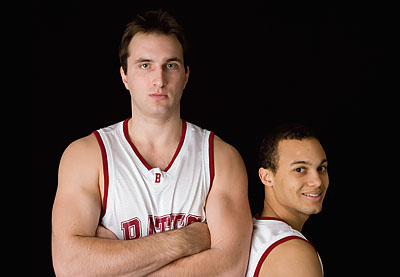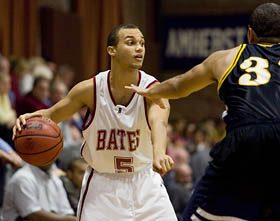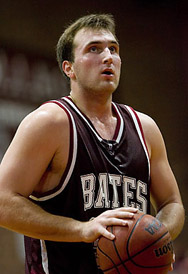Sports Notes
Zak Ray and Rob Stockwell began Bates together as first-year roommates in Page 410. Four years later, they’re ending their college careers together as co-captains of the 2006–07 men’s basketball team.
In between, they’ve led the men’s program to its winningest four-year stretch since the program’s inception in 1920: 72 wins against just 24 losses (through late January), with postseason victories in the New England Small College Athletic Conference Championships each year.

Rob Stockwell (left) and Zak Ray.
“A decade from now,” says head coach Joe Reilly, “people aren’t going to say this was the Zak Ray era or the Rob Stockwell era. It’s the Stockwell-Ray era.”
Though hyphenated in their coach’s mind, the two players and close friends would seem to have little in common.
Stockwell is the big man, the irresistible force just looking for a supposedly immovable object. A 6-foot-5, 240-pound scoring and rebounding machine, he’ll readily admit to his hardheaded ways, how he forges through games, arguments, and most any conflicted situation with the conviction that his way is the right way.
Ray, the 5-10 (or so) perimeter player extraordinaire, is more of a chameleon. Often a mediator or soother, at critical times in a ballgame he’s apt to uncoil into a floor leader of Pattonesque ferocity. “When things are going sour for the team, something goes off in my head, saying, ‘You need to do something now,’” he explains.
 Bates’ leading scorer and rebounder, Stockwell had climbed into the top 10 on Bates’ all-time scoring list by midseason this year. Ray, also a 1,000-point scorer for his career, this year became Bates’ all-time leader in assists (passing Herb Taylor ’84) and steals (passing Sean McDonagh ’92).
Bates’ leading scorer and rebounder, Stockwell had climbed into the top 10 on Bates’ all-time scoring list by midseason this year. Ray, also a 1,000-point scorer for his career, this year became Bates’ all-time leader in assists (passing Herb Taylor ’84) and steals (passing Sean McDonagh ’92).
In deeds and words, Ray is the classic playmaker. “All-time assists means more to me [than the 1,000 points],” he told the Bangor Daily News in January. “I’m actually kind of disappointed in myself that I didn’t get to the assists record before the points. [But] it’s not just me who scored the 1,000 points. It’s my teammates and the guys who set screens for me.”
Right back at you, says Stockwell. His friend’s all-around high standing in the Bates record book “is just a testament to him and how unselfish he is.”
Both agree that their quick personal connection in their freshman year immediately translated onto the court. They played so well together in preseason pickup games and then team practices that they left Reilly little choice but to play them as freshmen. By all accounts they even assumed leadership roles that season, a somewhat anomalous development under Reilly, who normally favors building players’ roles with each successive season.
Ray’s and Stockwell’s careers mirror the rise of men’s basketball at Bates and also demonstrate just how talented NESCAC athletes are today. (And since 1995, when NESCAC began competing in NCAA Championships, conference teams have made seven Final Four appearances.)
In Ray, for example, Reilly recruited one of the best Maine schoolboy basketball players of recent years, a super-quick point guard who led hometown Bangor High to two state titles in basketball (and one in football) and got lots of interest from Division I and II schools. “I don’t go anywhere in the state of Maine without somebody asking me about Zak Ray,” Reilly says.
Stockwell is a transfer from Division I Lafayette College who can bang home three-pointers on the run and bang bodies underneath for tough rebounds. The Temple, N.H., native did a postgrad year at New Hampton (N.H.) School, where he could guard teammate Rashad McCants in practice or opponent Craig Smith in a game — both now play in the NBA — and not look foolish.
 Over the years, their proclivities have rubbed off on one another. Ray has grown more assertive while Stockwell has mellowed, a little. “I’m just an emotional guy, you could say,” Stockwell says. “I feel everything — everything — very strongly, on or off the court. Zak is good at adapting, and that’s the quality I’ve always loved about Zak. He can kind of see everybody’s point of view, which I have a really hard time doing, even though I try sometimes. He can step back and know what people need.”
Over the years, their proclivities have rubbed off on one another. Ray has grown more assertive while Stockwell has mellowed, a little. “I’m just an emotional guy, you could say,” Stockwell says. “I feel everything — everything — very strongly, on or off the court. Zak is good at adapting, and that’s the quality I’ve always loved about Zak. He can kind of see everybody’s point of view, which I have a really hard time doing, even though I try sometimes. He can step back and know what people need.”
That perspective is evident when one considers how Ray’s hoop dreams have intersected with the College’s real efforts to improve its diversity. Ray is one of the coordinators of Amandla!, the campus group for students of African descent, and one of the group’s goals is to help Bates attract a more racially and culturally diverse student body — hosting prospective minority students, and helping provide a “surrogate family” for minorities on campus.
Those efforts complement Ray’s leadership role on the basketball team, which involves helping to recruit potential Bates students. “Coach Reilly has brought a number of African American and Hispanic students to campus, students who maybe will be able to play basketball here, maybe they won’t,” he says. “It’s not just Admissions’ burden and not just President Hansen’s burden to find ways to get more multicultural students on campus. I’m doing everything I can to help, as are the other players on the team.”
Thanks to all the W’s posted by Ray, Stockwell, and their teammates, 10th-year coach Reilly is now only the second men’s coach in Bates hoop history with a winning record (134-99 through late January), the other being Bob Peck (88-86), who coached teams in the ’50s and early ’60s.
As he considers Ray and Stockwell’s lasting impact, Reilly sees “not just two great players that have been on great teams. They’ve been a program builder, both of them together. They’re building a great program that’s going to be sustained after they leave.”